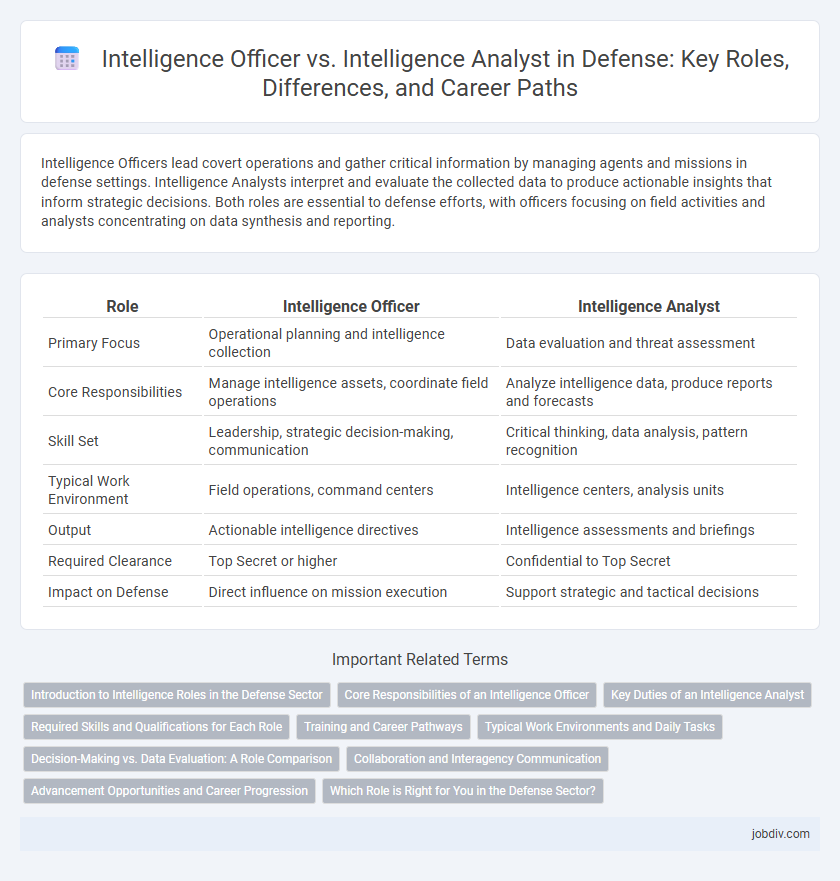Intelligence Officers lead covert operations and gather critical information by managing agents and missions in defense settings. Intelligence Analysts interpret and evaluate the collected data to produce actionable insights that inform strategic decisions. Both roles are essential to defense efforts, with officers focusing on field activities and analysts concentrating on data synthesis and reporting.
Table of Comparison
| Role | Intelligence Officer | Intelligence Analyst |
|---|---|---|
| Primary Focus | Operational planning and intelligence collection | Data evaluation and threat assessment |
| Core Responsibilities | Manage intelligence assets, coordinate field operations | Analyze intelligence data, produce reports and forecasts |
| Skill Set | Leadership, strategic decision-making, communication | Critical thinking, data analysis, pattern recognition |
| Typical Work Environment | Field operations, command centers | Intelligence centers, analysis units |
| Output | Actionable intelligence directives | Intelligence assessments and briefings |
| Required Clearance | Top Secret or higher | Confidential to Top Secret |
| Impact on Defense | Direct influence on mission execution | Support strategic and tactical decisions |
Introduction to Intelligence Roles in the Defense Sector
Intelligence Officers lead strategic operations by collecting, managing, and disseminating critical defense intelligence to support mission objectives. Intelligence Analysts interpret raw data, transforming it into actionable insights to anticipate threats and inform decision-making processes. Both roles collaborate to ensure comprehensive security measures and effective defense strategies.
Core Responsibilities of an Intelligence Officer
An Intelligence Officer is primarily responsible for collecting, evaluating, and disseminating actionable intelligence to support military or national security operations. They coordinate field operations, manage intelligence assets, and ensure the timely flow of critical information to commanders and decision-makers. Their role demands expertise in human intelligence (HUMINT), surveillance, and counterintelligence activities to protect strategic interests.
Key Duties of an Intelligence Analyst
Intelligence Analysts gather, evaluate, and interpret raw data from multiple sources to produce actionable intelligence reports that support military and defense operations. They identify patterns, assess threats, and provide strategic insights to inform decision-making at various command levels. Their work is critical in anticipating enemy actions, mitigating risks, and shaping operational tactics within the defense intelligence community.
Required Skills and Qualifications for Each Role
Intelligence officers require strong leadership skills, strategic thinking, and experience in field operations, often necessitating a background in military or law enforcement with security clearances. Intelligence analysts focus on critical thinking, data analysis, and expertise in information technology or foreign languages, typically holding degrees in political science, international relations, or computer science. Both roles demand proficiency in gathering, interpreting, and disseminating intelligence, but officers emphasize operational execution while analysts prioritize detailed evaluation and reporting.
Training and Career Pathways
Intelligence Officers receive specialized military and leadership training focused on operational planning, fieldwork, and managing intelligence teams, whereas Intelligence Analysts undergo extensive education in data analysis, critical thinking, and specialized software to interpret intelligence reports. Career pathways for Intelligence Officers often lead toward command roles and strategic decision-making positions within defense agencies, while Intelligence Analysts typically advance to senior analytic roles or technical advisory positions supporting defense operations. Both career tracks emphasize continuous professional development through advanced courses and certifications tailored to their specific functions within the intelligence community.
Typical Work Environments and Daily Tasks
Intelligence Officers typically operate within military bases or government agencies, coordinating intelligence collection and overseeing field operations to support defense strategies. Intelligence Analysts are often situated in secure offices or command centers where they analyze raw data, produce actionable intelligence reports, and assess threats to inform decision-making. Both roles collaborate closely to ensure accurate intelligence dissemination and mission success in defense operations.
Decision-Making vs. Data Evaluation: A Role Comparison
Intelligence Officers execute decision-making processes by synthesizing field reports and operational data to guide mission strategy, emphasizing leadership and rapid judgment in dynamic environments. Intelligence Analysts specialize in data evaluation, employing advanced analytical techniques to interpret raw intelligence and identify patterns critical for informing strategic planning. While Officers prioritize actionable decisions influencing immediate defense operations, Analysts focus on comprehensive data interpretation to support long-term intelligence objectives.
Collaboration and Interagency Communication
Intelligence Officers and Intelligence Analysts collaborate closely to enhance situational awareness and operational decision-making within defense environments. Intelligence Officers coordinate with multiple agencies to ensure timely and accurate information flow, while Intelligence Analysts interpret and synthesize raw data into actionable intelligence. Effective interagency communication between these roles fosters a unified approach to threat assessment and strategic response.
Advancement Opportunities and Career Progression
Intelligence Officers typically experience faster career progression through leadership roles in field operations and strategic planning, benefiting from operational experience and command responsibilities. Intelligence Analysts advance by specializing in data interpretation, cyber intelligence, and threat assessment, with opportunities to move into senior analysis or advisory positions. Both career paths offer promotion prospects, but Officers often achieve higher rank earlier due to broader command duties, while Analysts gain advancement through expertise and technical proficiency.
Which Role is Right for You in the Defense Sector?
Intelligence Officers lead field operations, manage human intelligence collection, and oversee strategic decision-making processes, making them ideal for individuals who excel in leadership and high-pressure environments. Intelligence Analysts specialize in data evaluation, threat assessment, and producing actionable intelligence reports, suiting those with strong analytical skills and attention to detail. Choosing the right role in the defense sector depends on whether you prefer direct operational involvement or focused analytical work supporting military strategy.
Intelligence Officer vs Intelligence Analyst Infographic

 jobdiv.com
jobdiv.com